
-
Save
Yashodhara Theri: The Journey to Arahantship - Part 1
The relationship between Prince Siddhārtha and Princess Yaśodharā was not an ordinary one. It had its roots in an extremely long past and was deeply established. Although it is difficult to trace the exact beginning of their saṁsāric bond, during the time of the Dīpaṁkara Supreme Buddha, a remarkable event took place.
At that time, the Bodhisatta was born into a very wealthy brahmin family. When he grew into youth and strength, instead of marrying and managing his wealth, he longed to renounce household life and live as an ascetic. His parents, however, strongly opposed his wish. Yet, immediately after the passing away of his beloved parents, he renounced all luxuries, gave away his wealth, and became an ascetic. His name was Sumedha, and thus he came to be known as the ‘Ascetic Sumedha’.
………Sumēdha renounced household life, went to the Himalayas, and became an ascetic. He attained the jhānas and the direct knowledges (abhiññā) on his own. One day he was traveling through the sky above the city of Ramma, the city to which he normally went in search of salt and condiments. On that day, he saw the townspeople eagerly decorating a road. Seeing this, he descended to the ground and approached them.
“Friend, why are you decorating this road?”
“Acetic, Dīpaṁkara, the Supremely Enlightened One (Buddha), the Great Sage who frees beings from suffering of existence, is coming to our city accompanied by a large retinue of monks.”
The moment Sumēdha heard the word ‘Buddha’, his whole body quivered with excitement. Sumēdha too asked for an opportunity to help prepare the road. The people then gave him a difficult, muddy section of the road to prepare. With his psychic powers, Sumēdha could have accomplished the task instantly, but he chose to do it by the sweat of his brow. Having taken a hoe and gunny sack, he carried soil and spread it evenly over the muddy section of the road.
Suddenly, an uncanny silence accompanied by peace and calm filled the air. The ascetic Sumēdha looked up and saw an unbelievable sight.
‘The Sage who frees beings from the suffering of existence is coming this way!’
Agitated, Sumēdha thought to himself: ‘Oh no! I still haven’t finished the section of the road assigned to me. What should I do?”
He then glanced back and forth between the Buddha and the muddy road. There was no time to think. Sumēdha laid down on the muddy section of the road with his head toward the Buddha, and palms joined together in veneration. Sumēdha spoke aloud to the Buddha:
“May the Great Sage who frees being from the suffering of existence not tread on the mud but walk across my back instead.”
Standing beside the ascetic Sumēdha, the Buddha Dīpaṁkara addressed the monks:
“Monks, look at this magnificent ascetic lying in the mud, asking me to walk across his back. He is a future Buddha-to-be. For that purpose, he must cultivate the perfections (pāramī) for a very long time. Four incalculable eons and a hundred thousand eons from now, an eon called ‘the fortunate eon’ will arise. In that eon, three Buddhas will arise before him; he will be the fourth.
Monks, that Buddha’s name will be ‘Gotama’. In that life, he will be born in Kapilavatthu, his father will be the king Suddhodana, his mother the Queen māyā. Meditating under the Assattha tree, gaining insight into reality, he will attain enlightenment by defeating mārā.”
(‘Buddha: ‘The Marvelous Sage’ book, Ven. Kiribathgoda Gnānānanda Thera)
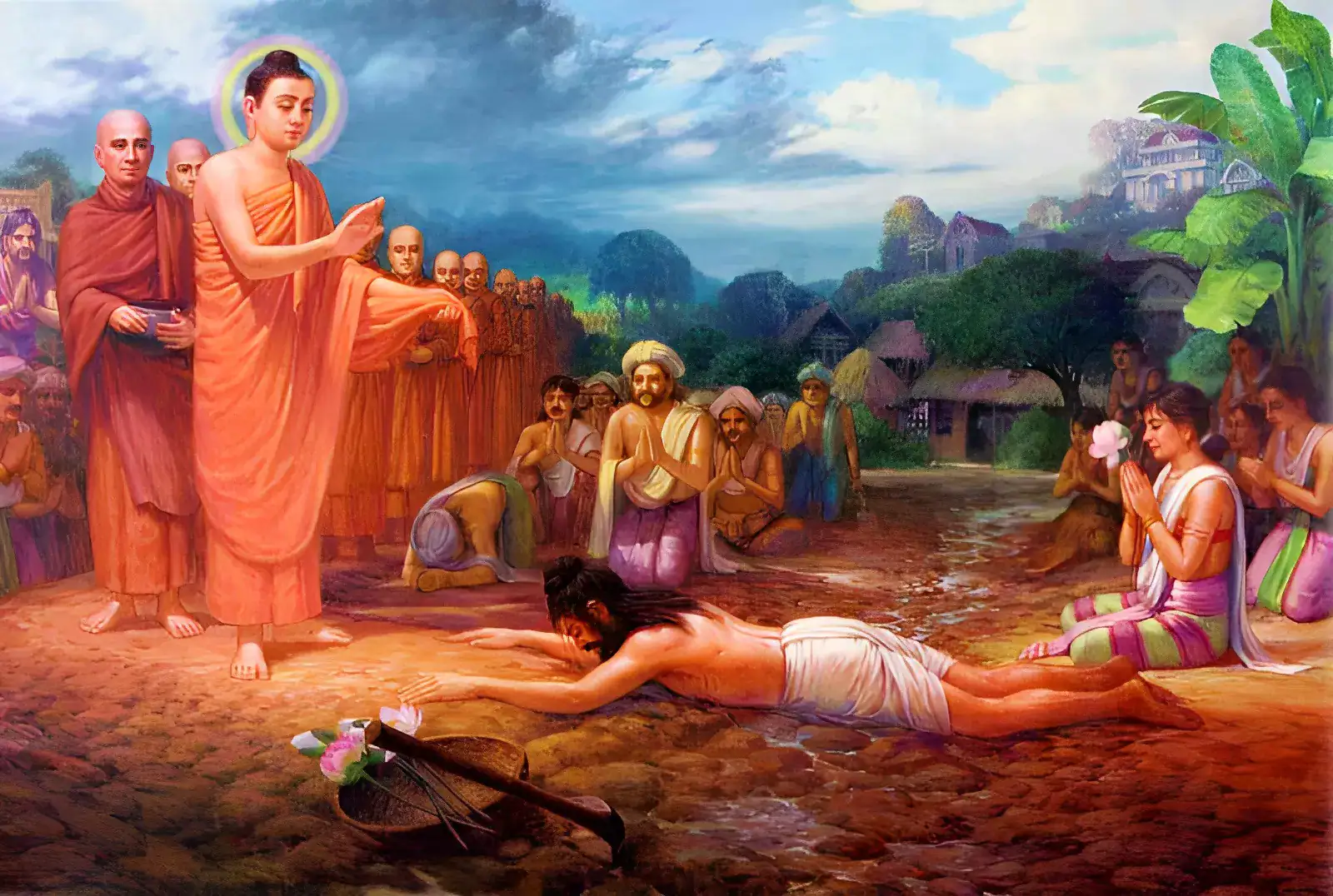
-
Save
While these wondrous events were taking place, all the townspeople had gathered to witness them. First came their initial amazement: the amazement of the Great Sage, the Enlightened One, the Buddha Dīpaṁkara. And now there was a second amazement—the amazement of the ascetic Sumedha.
From this moment onward, he was no longer just an ordinary ascetic. He had received the definite word from the Buddha Dīpaṁkara: he was destined to become a great and unique being, a Buddha-to-be (Bodhisatta). Blessed by the Buddha Dīpaṁkara, he was assured of attaining Buddhahood in the far future, after four incalculable eons and one hundred thousand eons, under the name Gotama.
The townspeople were overjoyed by both wonders and felt immense happiness in beholding them. Among the crowd was one lady, a paribbrājikā—a female wanderer, one who had gone forth. Though she, too, witnessed both amazements like the others, her heart was especially moved by the ascetic Sumedha. She was filled with wonder and could not take her thoughts away from him.
At once, she offered two bunches of blue lotuses at the feet of the Enlightened One, the Buddha Dīpaṁkara, and made a wish.
“May these flowers be offered to the Great Teacher, the Buddha. By the merit I accumulate, may I become the woman who wholeheartedly supports this noble ascetic in accomplishing Buddhahood throughout the four incalculable eons and one hundred thousand eons. May I be Yaśodharā, the one who bears his only child, Rāhula. May I remain ever by his side, his constant companion, and assist him in every way—through body, speech, and mind—in fulfilling the perfections necessary for Buddhahood. Just as this ascetic Sumedha has received the great proclamation of Buddhahood, so too may my aspiration be fulfilled.”
The story of this paribbrājikā is also remarkable. It is as follows:
The wife of Prince Dīpaṁkara (in the lay life of the Buddha Dīpaṁkara) was Queen Padumā. One day, a noble lady named Sumitrā saw the queen and was deeply moved. She was struck with joy and admiration at Padumā’s charming qualities and unsurpassed beauty. Her glory and majesty touched Sumitrā’s heart so profoundly that, from the moment she saw her, she could think of nothing else.
At last, Sumitrā made a firm decision. Though her wealthy parents and relatives tried to dissuade her, she renounced everything and chose the homeless life. She became a paribbrājikā. Her wish was to gather great merit by living in celibacy, practicing it strictly in the way only a few paribbrājikās did at that time. Her aspiration was clear: to accumulate sufficient merit so that, in the future, she might become a queen like Padumā—the wife of a Buddha in his lay life.
It is truly amazing that, even without knowing of a future Buddha, she aspired to be the wife of a Buddha in lay life. To achieve this goal, she believed that accumulating merit was the path. Thus, she chose a life of celibacy. Isn’t it wonderful? Even before she had heard of a Buddha-to-be, she had already begun preparing herself for him.
She did not know how long a Buddha must strive to fulfill the requirements of Buddhahood. Yet she was ready for the journey. She did not know that she would one day have to endure immense sacrifices. She did not know that she would bear sorrows unparalleled, and devote herself in ways no one else ever could.
She did not know that children born of her own blood would be given away by the Bodhisatta as alms. She did not know that she would have to make these sacrifices not just once, but countless times, across innumerable lives. She did not know that she would one day offer up her very life, becoming food for porisādas (cannibals), for ferocious monsters, and for wild beasts.
She did not know that she would be called to relinquish everything—wealth, ornaments, clothing, houses, kingdoms, palaces, servants, all possessions. She did not know that she would have to endure sorrow and pain through countless lives, across countless eons, without pause.
And she did not yet know that from this moment forward, she was destined to face hardships uniquely set apart for the wife of a Bodhisatta—hardships greater than any other woman in the world would ever bear.
So, while she was wandering with that aspiration in her heart, she happened to witness this wondrous event. That is why, at first sight, she was inspired by it and immediately made her wish.
Both the ascetic Sumedha and the paribbrājikā Sumitrā made separate vows—vows that were destined to be fulfilled together in the far future. Yet, in that very life, they never met again. The ascetic entered the dispensation of the Buddha Dīpaṁkara and became a monk, while the paribbrājikā continued her celibate life in solitude.
And thus began the story of our Bodhisatta and his beloved wife, Yaśodharā.
From the moment Sumitrā made her solemn aspiration, she devoted herself to performing abundant meritorious deeds, again and again, across countless lives, sustained by her one great determination: to be united with her life-companion, the future Buddha. Our Bodhisatta continued gathering merit to fulfill the path of Buddhahood, and she, Sumitrā, continued supporting him in that vast endeavor.
She was ever at his side, like a shadow. Like a mother, she gave him energy and courage. Like a friend, she offered encouragement and strength. Like a sister, she sacrificed all to see his success. Like a daughter, she was humble and obedient. Like a servant, she bore hardship and toil. And as his true wife, she gave herself completely—there was nothing she would not do for him. She helped him in every way and breathed life into the fulfillment of the ten perfections.
In brief, she nourished the field of merit that the Bodhisatta cultivated for Buddhahood. For four incalculable eons and one hundred thousand eons, she carried out this sacred task. It became an ocean of tears, an ocean of patience, an ocean of endurance, an ocean of blessings, an ocean of care, an ocean of love—above all, a vast ocean of merit.
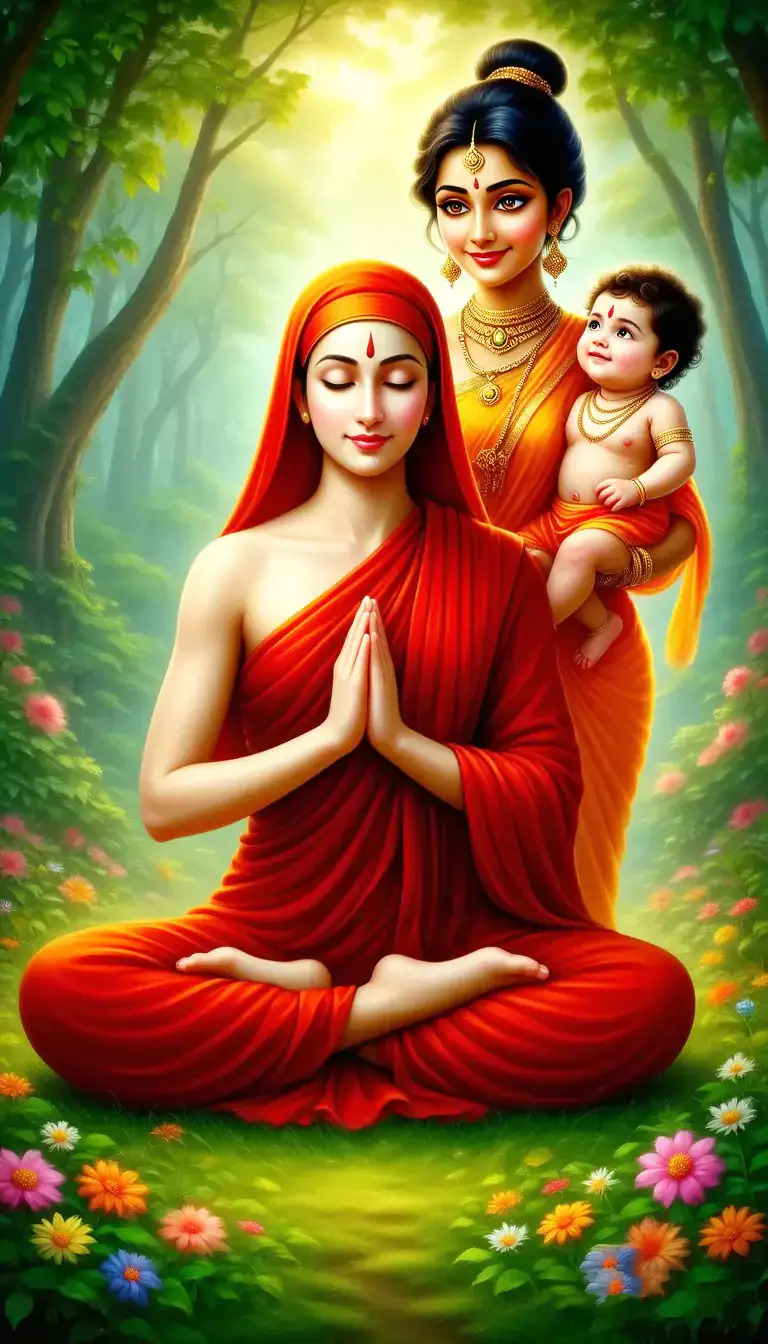
-
Save
In countless lives, she renounced the world and entered the forest together with the Bodhisatta, abandoning great wealth, beloved cousins, children, parents, relatives, kingdoms, palaces, and every luxury. Across innumerable lifetimes, through incalculable eons, whenever he wished to give, she never held anything back but allowed him to give everything away. Whenever he chose the path of celibacy, she too lived likewise.
In ages long past, there were eras when human lifespans stretched for hundreds, even thousands, and at times hundreds of thousands of years. In such ages, she devoted herself wholly to celibacy, or else lived gracefully with one husband alone. She never once acted against him, nor did she even think to oppose him. With complete devotion, she supported her husband in every way.
When the Bodhisatta was guarding his six sense faculties, she never caused him disturbance; instead, she practiced the same restraint. When the Bodhisatta was striving to fulfill the ten perfections, she too practiced them without obstruction. Sexual misconduct was something she never committed. Indeed, she was willing to sacrifice her very life unto death, but she never violated this vow.
Sumitrā’s determination to become the consort of a Buddha in lay life was not something she merely wished for, nor was it a simple imitation of the queen. It was an extraordinary aspiration—one beyond the grasp of a worldly mind.
In modern times, we often see only imitations and attempts at imitation, which in truth carry little meaning. Just by seeing or hearing, people tend to mimic those they admire. They imitate countless figures: actors and actresses, heroes and warriors, cricketers and players, politicians and celebrities, and at times even smugglers and criminals. Yet none of these imitations can bring true inner peace, nor even a small measure of lasting satisfaction.
For in such figures, one rarely finds loving-kindness, compassion, generosity, equanimity, or virtue—qualities that bring genuine goodness and real happiness. Instead, what is most often seen is jealousy, immorality, conceit, lying, arrogance, deception, selfishness, delusion, violence, dishonesty, ego, envy, greed, hatred, unreliability, and many more defilements.
But in Sumitrā’s aspiration there was not a trace of such qualities. Her wish was utterly free of blemish. It was truly pure—pure as a freshly washed conch shell.
Beyond this, it is rare today to find people who cultivate virtues innocently and make wishes with true altruism. Most do not even realize that their desires are so deeply rooted in ego. Men and women alike are caught in countless wishes and dreams, all aimed at building something around themselves—seeking happiness and success for their own sake.
But the wishes of our ascetic Sumedha and of Sumitrā were of a wholly different nature. They were absolutely pure—pure as a freshly washed conch shell. In the purity of their vows, not even the slightest scar or speck of dirt could be found.
Sumitrā’s journey, which began at the feet of the Buddha Dīpaṁkara, remained unchanged until she finally gained the position of Rāhula Mātā. Just as a fine stream flowing through the Himalayan range finds its rest in the great ocean, so too her determination—deeply engraved in the core of her heart—led unfailingly toward her birth as Yaśodharā. Her resolve was unshakable, like the mighty Himalayas, king of mountains. There was not the slightest flaw in her determination, not a single stain. It was utterly pure, free even from the subtle taint of self-view.
It is no exaggeration to say that she was the very lifeblood of the fulfillment of the Ten Perfections that our Bodhisatta required in order to attain Buddhahood. Who else but our Great Teacher, the Lord Buddha himself, could truly know the measure of Yaśodharā and the countless sacrifices she made for the sake of the Bodhisatta’s great mission?
In the first year of his Enlightenment—seven years after the Great Renunciation—our Lord Buddha, moved by boundless compassion, returned for the first time to his native country of Kimbulvatpura, to guide his relatives with the pure Dhamma.
On the second day, the Lord Buddha and his great retinue of arahants were walking along the main street, begging for alms. The previous day, neither the royals nor King Suddhodana had remembered to invite the Lord Buddha for the next day’s alms. Instead, they were in a hurry to arrange alms at the king’s palace and were very busy organizing the alms hall.
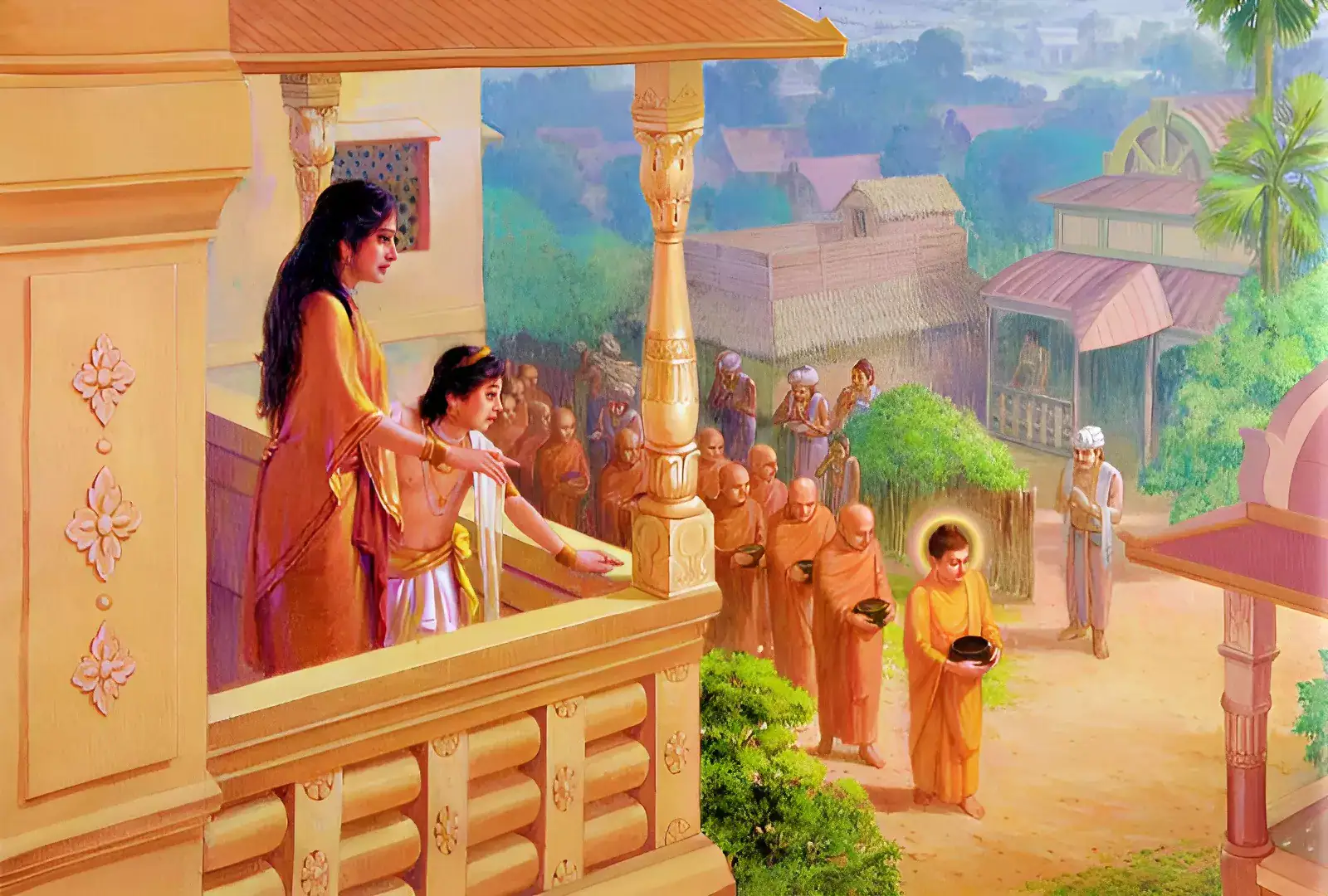
-
Save
The Buddha did not find it demeaning to go for alms on the royal avenue. It did not occur to him that in his life as a prince he had traversed the same streets by royal horse carriage. The next day, taking his bowl in hand, with a liberated and concentrated mind, full of compassion, the buddha went on his alms round from door to door without skipping houses. When princess Yaśodarā saw this, she rushed to king Suddhodana in tears and told him what was happening. King Suddhodana was deeply agitated on hearing this and left the palace in great haste. Gathering up the folds of his shawl in his hand, he ran to and stood in front of the Blessed One.
“Why, venerable sir, do you bring disgrace upon us? Why do you go about begging for foods? Are we not able to give alms to yourself and the sangha of monks?”
“Great king, it is the customary practice of our lineage to beg for alms from door to door without skipping houses with a detached mind, just for the continuance of life”
“Venerable sir, how can that be? How can there be such a custom in our Mahāsammata lineage, the royal Okkāka lineage? Have you ever heard of even a single khattiya who has gone begging for alms in this way?”
“Great king, the royal Okkāka lineage is your lineage, not ours. Our lineage is the lineage of the Buddhas with liberated minds, who gave up the two extremes and by walking the middle way defeated the armies of Mārā; and having won over all defilements, through omniscient knowledge realized all phenomena like the back of one’s hand. All of those Buddhas went begging for alms from door to door without skipping houses”
(‘Buddha: ‘The Marvelous Sage’ book, Ven. Kiribathgoda Gnānānanda Thera)
Then, standing there in the middle of the street, the Buddha preached the Dhamma to the king. By hearing the first two verses of the stanza, the king attained the fruition of stream-entry, and by hearing the last two verses, he attained the fruition of once-returning.
At a later time, he attained the fruition of non-return by hearing the Mahā Dhammapāla Jātaka story. While lying on his royal bed under the royal white parasol, he attained the fruition of Arahantship and passed into final Nibbāna on the very same day.
After the almsgiving, when the Buddha was about to gladden and delight the almsgivers with a dhamma talk, he noticed the conspicuous absence of Yaśodarā. When the Buddha asked the king where she was, the king answered,
“Venerable sir, she says ‘if the Buddha knows me for who I am, he will come see me,’ and has stayed behind in her bed chamber”
Then the Buddha along with the chief disciples Sāriputta and Moggallāna went to Yaśodarā’s bed chamber and sat on the prepared seat. Yaśodarā rushed to the Buddha and clinging to his feet, began to sob with her head resting on his feet. Then king Suddhodana said:
“Venerable sir, since the day of your great renunciation, she has been in tears. When she heard that you were taking only one meal per day, she too began to take only one meal per day. She gave up beds of comfort and slept on the floor. She refrained from using garlands and perfumes. Having taken off her jewelry, she dressed in yellow garments”
The Blessed One said:
“Great king, this princess who lives under your guardianship, having fulfilled the perfections, is of mature wisdom, therefore it does not come as a surprise that she showed such commitment. In a past life when she was born as a kinnari, without anyone to protect her, while staying over her husband who was lying unconscious, she selflessly offered her life to save his.”
Saying so, the Buddha narrated the Canda-Kinnara jataka.
(‘Buddha: ‘The Marvelous Sage’ book, Ven. Kiribathgoda Gnānānanda Thera)
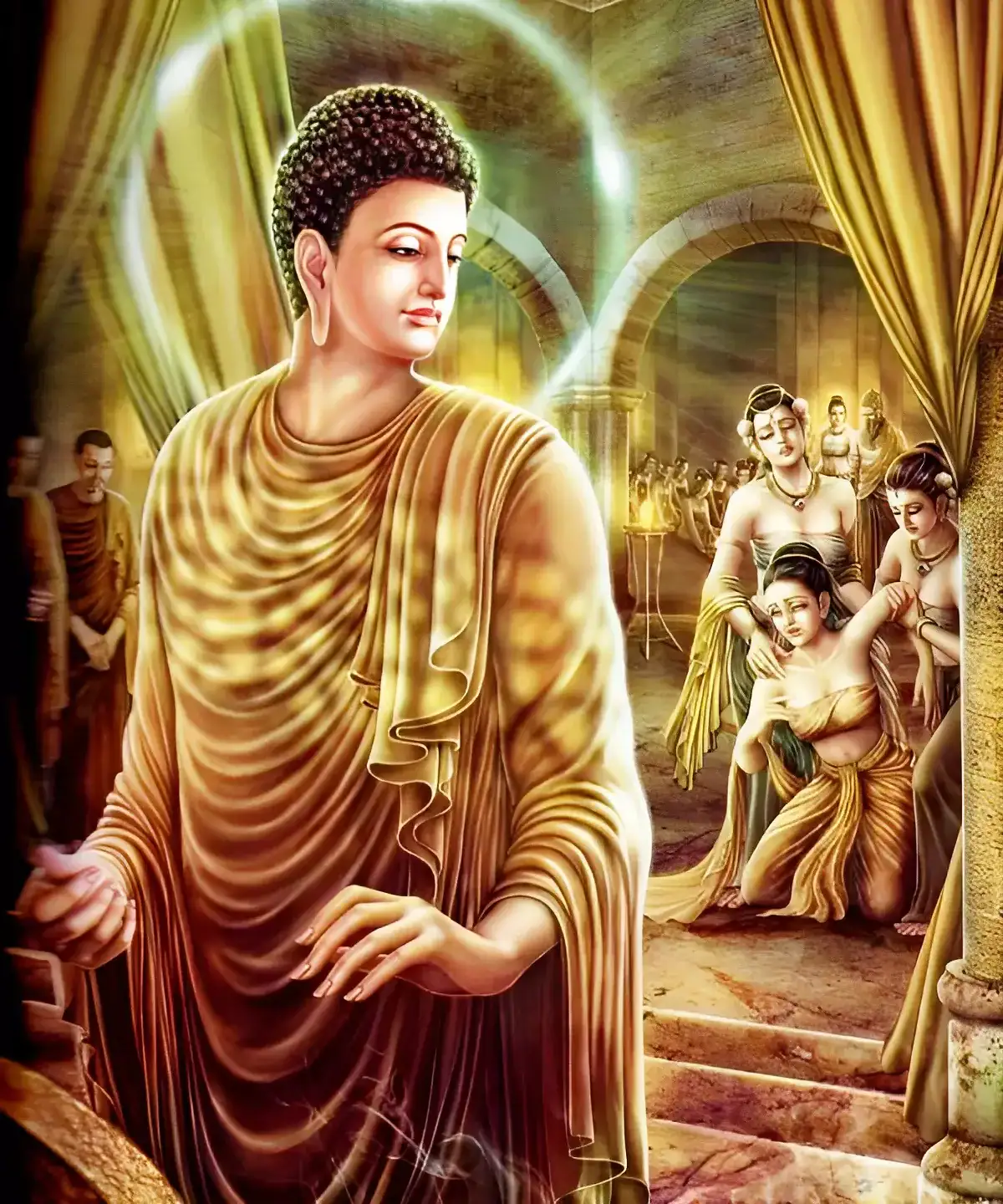
-
Save
We can’t imagine how Yaśodarā felt when she finally heard the voice she had longed for over seven years—the voice she had missed for seven years, the voice so familiar to her for countless eons, and above all, the voice of a Buddha in his sweetest Brahmasvara (voice like Brahma’s).
Her heart stopped for a moment when she saw the Buddha. Unable to collect her thoughts, she simply gazed at him. This was the culmination of her long journey through saṁsāra—the journey of a life spent for the sake of the Bodhisattva, of giving her children away in alms. Now, it had reached its end. She looked at the Buddha for a few more seconds, eyes brimming with tears, before running to him, falling at his feet, and lamenting with a heavy heart.
The tears she had shed through four incalculable eons and a hundred thousand eons in devotion to the Great Being now seemed to pour out all at once, in this very moment. Her tears fell at the Blessed One’s feet. She embraced them tightly, lamenting like an ocean without shore. No one dared approach her to console her. Yet, since these were the feet of none other than the Buddha, the king stepped forward. With great compassion and a mind perfectly liberated, the Buddha, who knew the purity of Yaśodarā’s heart, spoke thus:
“Great king, let Yaśodarā cry as much as she wishes. If she does not have the chance to wash away her sorrow with tears, her heart may break. Therefore, great king, let her cry freely. May she be relieved of her grief. May she be healed.”
Upon this, the king revealed to the Lord Buddha the virtuous life she had led over the past seven years.
“Lord, Blessed One, the moment you gave up worldly pleasures, she also tried to abandon the palace and renounce, saying she had no interest in the royal comforts you had left behind. Hearing this, I immediately strengthened the guards even more. While staying in the palace, she began living like a forest hermit. She exerted herself as much as you did. She shaved her head and donned rough robes. She lay on the floor without sleeping on the comfortable beds with soft pillows; she even slept without a mat. She refused comfortable high seats, choosing to sit on low ones. She renounced all luxuries, leaving behind floral scents and perfumes. She took her food in a clay bowl and ate only in the morning. For the past seven years, she has practiced austerity in this way. Like you, she too endured great suffering.”
“Not only that, Lord, upon hearing of your departure, kings and princes across Jambudvīpa sent messengers seeking her hand, sending precious gifts, jewels, and ornaments. But Lord, she never looked at those messages, nor did she pay them any attention.”
In this way, the king spoke with great admiration for Yaśodarā in the presence of one hundred and sixty thousand Shākyan royalties. Hearing of her virtuous life, all those previously unaware of her austerities and devotion to the Buddha were astonished. They raised their voices in unison, saying, “Sādu! Sādu! Sādu!” The Shākyas, who had been aware from the beginning, raised their voices even louder. The entire palace resounded with cries of “Sādu!” as thousands of Shākyans honored her virtuous life.
Yaśodarā regained her composure at the resounding voices of “Sādu.” She rose immediately, bowed at the Buddha’s feet, and stepped aside.
On that occasion, the Blessed One preached the Canda-Kinnara Jātaka story to the crowd. Hearing it, all the Shākyans cheered loudly and were deeply impressed. Shedding tears, they cried aloud, “Sādu! Sādu! Sādu!”
Once again, Yaśodarā bowed at the Blessed One’s feet and requested ordination in the Buddha’s dispensation. The Supremely Enlightened One, who knows the proper time for everything, declined her request, and the king likewise opposed it completely.
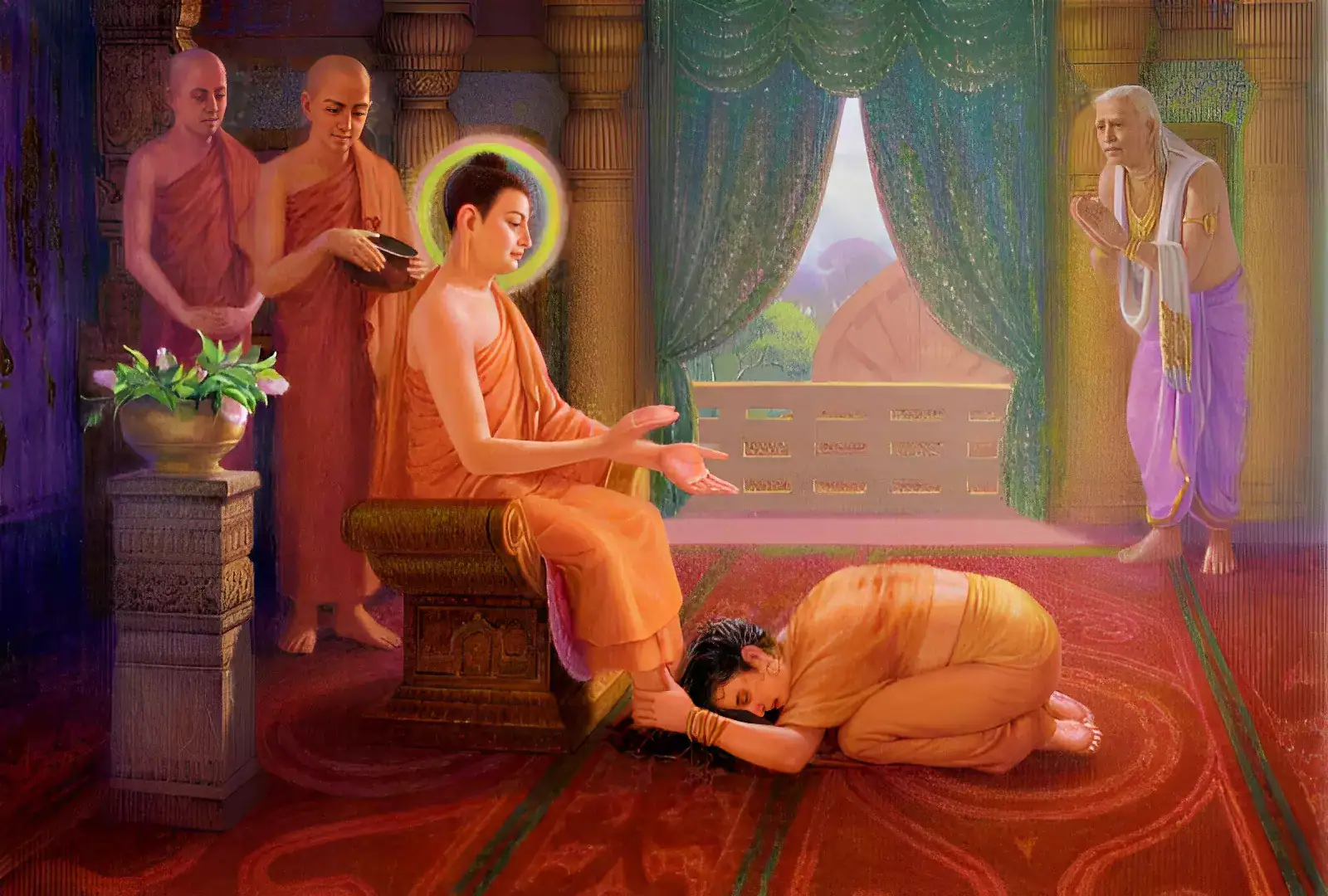
-
Save
On the second day after arriving at Kapilavattu, the buddha ordained his half- brother prince Nanda, the son of queen Mahā Prajāpatī Gotami.
On the seventh day, having taken his bowl and robe in the morning, the Buddha went to the royal residence of king Suddhodana. Then Yaśodarā told her son prince Rahula;
“Rāhula, my son, that there is your father. Go ask him for your inheritance. “
Then prince Rāhula went to the Blessed One and standing in front of him said:
“Monk, your shadow is pleasing to me”
The Blessed One left for Nigroda’s park. The young prince Rāhula, just seven years old, followed behind the Blessed One saying:
“Oh, monk! give me my inheritance. Give me my inheritance, oh monk!”
The Buddha addressed the venerable Sāriputta
thus:
“Well then, Sāriputta, ordain prince Rāhula”
In this way, prince Rāhula too received ordination in the glorious dispensation of the Buddha.
(‘Buddha: ‘The Marvelous Sage’ book, Ven. Kiribathgoda Gnānānanda Thera)
On that very seventh day, before sending her son to the Buddha, Yaśodarā recited the Naraseeha Gātha to Prince Rāhula, extolling the virtues of his father, the Buddha. She awakened faith in the little boy’s heart for a father he had never seen, and then sent him to the Blessed One. In the presence of the Tathagata, little Prince Rāhula said, “Lord, I feel great happiness even in your shadow,” and went with the Buddha, holding his finger to his temple.
Prince Rāhula received the highest gift he would ever receive from his father. In a dispensation finely established by the great Dhamma and discipline preached by a Buddha, what greater blessing could there be than monkhood? The young novice Rāhula later attained Arahantship and became known as the “foremost among monks willing to be disciplined in the order.”
When Yaśodarā heard that little Prince Rāhula had been ordained, she began to cry again. Yaśodarā’s life is truly a marvel—almost miraculous. Bereavement and tears are like the sap of her life, the very rhythm of her heartbeat. They are the inheritance of countless lives she has traversed. Yet the true miracle is that at no time have her tears been born of anger. She has shed more tears than the waters of seven great oceans, but never from hatred or wrath. How could one shed warm tears without anger? Yaśodarā has never been angry; her eyes have known only cold tears, filled with loving-kindness, patience, compassion, equanimity, and altruism.
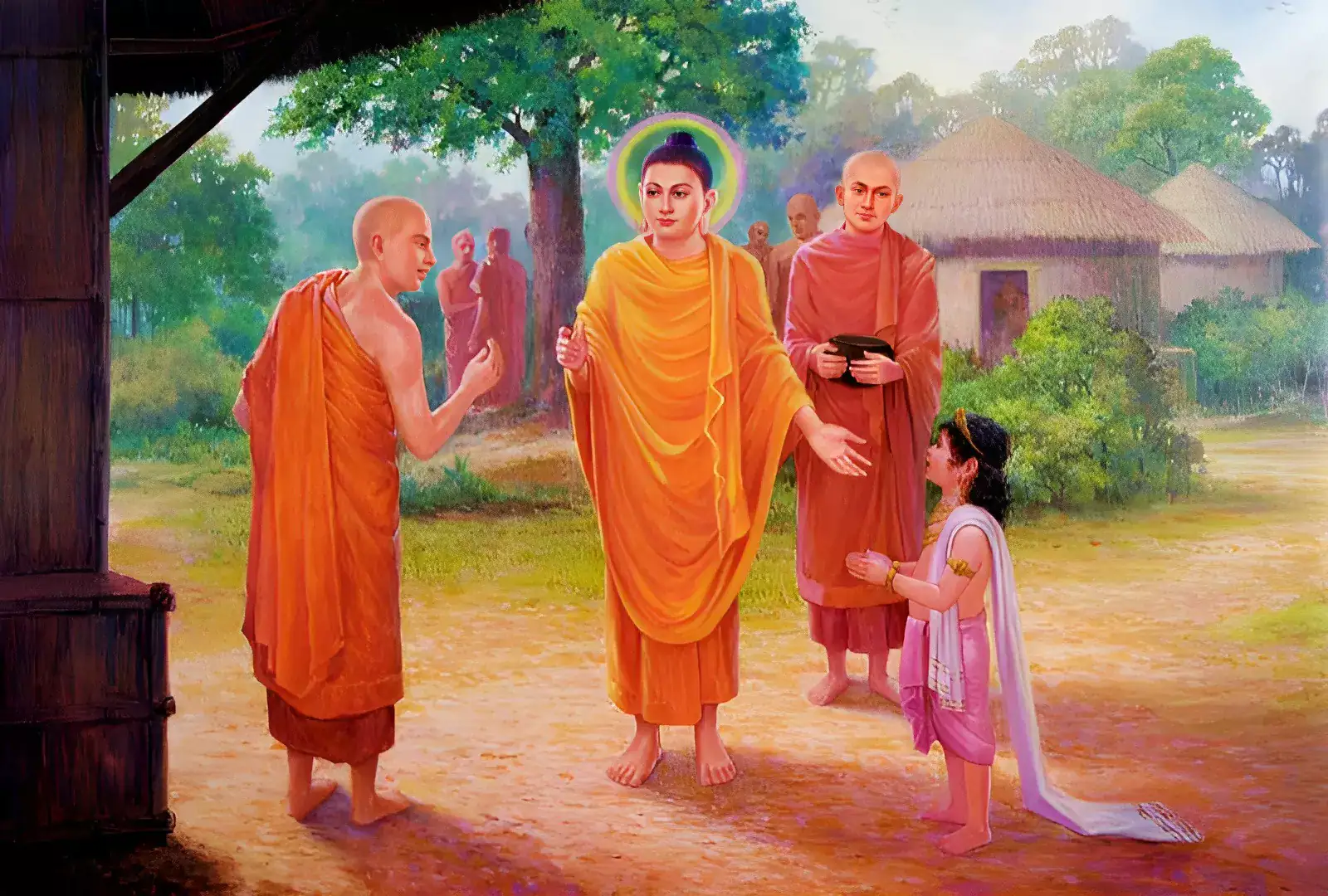
-
Save
At all times when she shed tears, they held true meaning. Every drop of sorrow she poured out in saṁsāra fertilized the field of perfections of the Bodhisatta and thereby hastened the emergence of the Supremely Enlightened One, whose appearance in the world is exceedingly rare. If we are fortunate enough to take refuge in the Triple Gem during the Buddha’s dispensation in this era, in the name of Gautama Buddha, we must never forget Yaśodarā, who silently bestowed this fortune upon us.
Because of her immeasurable sacrifices, unsurpassed love, and incomparable care, the Bodhisatta was able to accomplish the perfections required for Buddhahood so swiftly. Had she been consumed by hatred, anger, revenge, jealousy, greed, miserliness, hypocrisy, cruelty, or capriciousness, we would not even have had the opportunity to hear the name of Gotama Buddha in this era—let alone take refuge in the Triple Gem. Yet Yaśodarā, bearing every hardship and washing away all her sorrows in tears, empowered the emergence of Gautama, the Supreme Buddha, in this world.
Such is the untold story behind her tears. Her tears nurtured the liberation of beings, bringing countless others to the fruition of the path and the final bliss of Nibbāna across past, present, and future in the Gautama Buddha’s dispensation.
It is an undeniable truth that the arising of Gotama Buddha and the establishment of his dispensation would occur in this world. As foreseen and foretold by Buddhas, it happened exactly as predicted—no more, no less. Yet that reality was nourished and made possible by Yaśodarā, who endured difficulties, sorrow, and pain to help the Bodhisatta fulfill the ten perfections.
“May all beings listen to the Dhamma, strive to understand it, and act in accordance with it. Above all, may they be freed from all suffering and attain the final bliss of Nibbāna in this very dispensation of Gotama Buddha.”
Yashodhara Theri: The Journey to Arahantship – PART : 02
